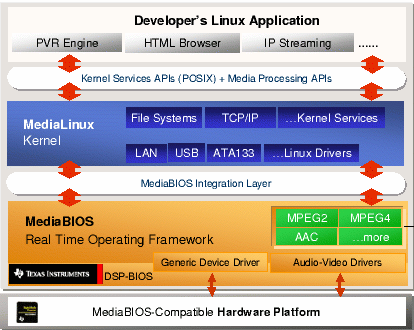World’s first native-DSP Linux port?
Nov 5, 2003 — by LinuxDevices Staff — from the LinuxDevices Archive — 2 viewsUpdated Nov. 6, 2003 — Start-up Softier claims to have produced the first usable implementation of Linux on a single-core digital signal processor (DSP). The company says its technology can perform real-time encoding/decoding of DVD quality video at 30 frames/second while simultaneously running standard Linux and standard Linux application software. (*).
In Q1, 2004, Softier will begin marketing its “MediaLinux” and “MediaLinux DSP Development Kit” for the Texas Instruments (TI) TMS320DM64x (“DM64x”) line of DSPs. The company will demonstrate these products running on a DM642 DSP based evaluation board during the TI Developer Conference series in Europe next week (Prague, Paris, Munich, and Birmingham — Nov 11-20).
TI also offers dual-core DSPs containing the combination of DSP with ARM cores, and these have been supported by Linux ports from the now-defunct RidgeRun as well as by current products from MontaVista. However, Softier believes running Linux directly on powerful DSPs, without ARM cores, can lower costs.
TI's DM64x DSP series is touted as especially high performing. Described by Softier Co-founder and CTO Eatamar Drory as a “one-chip video network,” the DM64x includes:
- a glueless interface to video
- BT.656, digital TV formats (SDTV and HDTV), raw video I/O
- audio serial port with up to 8 stereo lines
- on-chip 10/100 Ethernet MAC
- 66-MHz PCI for backplane chassis or PCI bus connection
TI claims up to 5760 million instructions per second (MIPS) at a clock rate of 720 MHz for the very long instruction word (VLIW) chip which executes up to 8 instructions per clock cycle and draws just 1.2 Watts power at 600MHz. A 1GHz version capable of 8,000 MIPS performance (due to the 8 instructions per clock cycle) will be available soon.

Softier's dual-kernel approach
Softier's MediaLinux employs a dual-kernel approach. A “standard Linux kernel” (derived from uClinux) runs on top of Softier's proprietary MediaBios. Softier co-founder and CTO Eatamar Drory says the company is aware of the FSMLabs patent covering dual-kernel technology used in RTLinux, and that Softier's approach does not infringe.
MediaBios is “totally de-coupled, an entity of its own,” according to Eatamar Drory, and can thus remain proprietary, much like the BIOS in PCs. MediaBios will be licensed to device makers on a royalty basis, and source code will be available in an SDK. MediaLinux, on the other hand, will be (as it must be) GPL. “Our Linux implementation is GPL, open, and we will give back to the industry,” notes Drory.
MediaBios is built around TI's hard real-time kernel DSPBIOS. It handles media-centric tasks in real-time, the company says. Softier is working on a MediaEngine that it claims will hide DSP-based media-specific issues from Linux developers. “Doing the media-centric stuff will be as easy as opening a file,” according to Drory.
MediaBIOS will support a variety of off-the-shelf CODECs, and allow developers to add their own.
Linux provides most everything else, including the system's only scheduler. Modern Linux drivers such as the ATA133, PCI, USB drivers are available to interface with peripherals, and other Linux drivers can be easily ported, the company claims. The full range of Linux filesystems is supported, Softier says.
Softier claims DSPs capable of supporting Linux directly have become available only recently, as a consequence of increases in processor clock speeds and instructions per clock cycle, as well as a significant expansion of the DSP instruction set. A previous attempt to provide a subset of Linux functionality (Red Hat's EL/IX spec) on DSP chips appears to have stalled in 2001.
Softier's demonstration at TI World will feature “a standard Linux kernel” running concurrent with “real-time playback of D1-resolution disk-resident video files.” The demonstration takes advantage of “MediaLinux's rich set of file systems, Open Source-based ATA133 device drivers and the ability of a MediaLinux application to run expressDSPTM-compliant algorithms,” according to Softier.
Softier says its MediaLinux solution will bring new options to DSP system design, allowing rapid introduction of media devices that are “fully DSP-driven,” and that combine the richness of embedded Linux with the versatility of the DSP as a media processor.
“We are encouraged to see the range of solutions available to DSP developers substantially expanded by the power of Embedded Linux,” commented Jean-Marc Charpentier, European DSP business development manager for TI. “The DM64x generation of DSPs offers unparalleled media processing power and flexibility, while maintaining system cost at minimum due to a rich set of on-board peripherals. Embedded Linux complements that power with the application programming interfaces and device drivers of a system processor.”
“We at Softier identified the opportunity to combine the power of the emerging de-facto standard in embedded software [Linux] with the best-in-class performance generation of DSP, and created a flexible, cost-effective engine for the next generation of consumer media devices,” said Softier CTO and cofounder Eatamar Drory. “The continuous momentum behind the DM64x generation and the wide industry support of embedded Linux ensures manufacturers' ability to protect their products from sudden obsolescence or rapid, extremely costly changes.”
For more details about Softier's approach, be sure to read this whitepaper about MediaLinux. See also this article from ExtensionMedia's 2003 DSP Resource Guide and visit Softier's website.
Subsequent to this story, LinuxDevices.com learned of another successful port of Linux to a DSP chip. See Another native-DSP Linux port — this one to ADI's Blackfin for details.
This article was originally published on LinuxDevices.com and has been donated to the open source community by QuinStreet Inc. Please visit LinuxToday.com for up-to-date news and articles about Linux and open source.